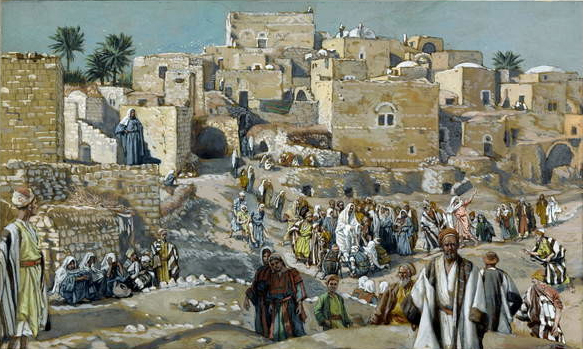Christian Art | Jesus And The Samaritans | King James Audio Bible
Luke 9: 51-56 – Week 26 Ordinary Time, Tuesday (King James Audio Bible Verses KJV, Spoken Word)
51 ¶ And it came to pass, when the time was come that he should be received up, he stedfastly set his face to go to Jerusalem,
52 And sent messengers before his face: and they went, and entered into a village of the Samaritans, to make ready for him.
53 And they did not receive him, because his face was as though he would go to Jerusalem.
54 And when his disciples James and John saw this, they said, Lord, wilt thou that we command fire to come down from heaven, and consume them, even as Elias did?
55 But he turned, and rebuked them, and said, Ye know not what manner of spirit ye are of.
56 For the Son of man is not come to destroy men’s lives, but to save them. And they went to another village.
Many Christians live in places that are hostile to Christianity. This hostility takes different forms. In the United Kingdom, there is significant but often banal hostility to Christianity, including on the part of those who term themselves notionally Christian, but who really never want to gather to worship God. Christians in the United Kingdom are not generally at risk of physical harm. It is a sickening truth that where there is such risk, it is most often sectarian, for example in Belfast or Glasgow.
In other territories, Christians suffer extreme and often systematic oppressions, especially in our time because of developments among Muslims, for example in Egypt and in western Africa. The lesson of these Bible verses, as Christ teaches his disciples, is a lesson for our time as well as for the time of Jesus. Where we encounter evil, especially in the form of the rejection of Jesus, we are not to curse those who refuse Jesus’ message to us all. Rather, we are to remember that Jesus came to save everyone.
‘I am the way, the truth and the life.’ We follow the example of Jesus. This is Jesus’ command. As on TV we see the churches burn and Christians murdered, this can be a hard commandment. As with the case of sectarian violence, we pray that all may accept Christ into their lives and so love God through His Word. Our prayers are for conversion. Meanwhile we go on our way to Jerusalem with Jesus. This is where our new life begins.
Concluding Prayer | Love Revealed By Jesus Christ
True Light of the world, Lord Jesus Christ,
as you enlighten all men for their salvation,
give us grace, we pray,
to herald your coming
by preparing the ways of justice and of peace.
Who live and reign with the Father and the Holy Spirit,
God, for ever and ever.
![]()

King James Audio Bible | Endnotes
Jesus And The Samaritans
Luke 9: 51-56 recounts an incident in which Jesus and his disciples were traveling to Jerusalem, passing through Samaria. As they entered a village, the Samaritans, who were considered by Jews to be a racially impure people and therefore despised, refused to receive them. This incident is a fascinating insight into Jesus’ relationship with the Samaritans, and how he navigated the fraught and complex racial and religious dynamics of the time.
To understand this incident fully, we need to delve into the history and context of the relationship between the Jews and the Samaritans. The roots of this relationship can be traced back to the time of the Babylonian exile, when the northern kingdom of Israel was conquered by the Assyrians, and its people were taken into captivity. The Assyrians then brought in people from other parts of their empire to settle in the region, intermarrying with the Israelites who had remained behind. These people became known as the Samaritans, and they developed a form of religion that was similar to Judaism but with significant differences, including the rejection of the Jewish Temple in Jerusalem as the center of worship.
The Jews and the Samaritans therefore had a long history of animosity towards each other, with each group considering the other to be apostates and impure. This animosity is reflected in several passages in the Old Testament, including Ezra 4:1-3, in which the Samaritans are portrayed as opposing the rebuilding of the Temple in Jerusalem, and Nehemiah 4:1-3, in which they are described as mocking the Jews’ efforts to rebuild the city walls.
Despite this history of animosity, Jesus had a different approach to the Samaritans. Jesus famously had a conversation with a Samaritan woman at a well in John 4, in which Jesus revealed himself as the Messiah, and in doing so challenged both her and his disciples’ assumptions about race and religion. This encounter is significant not only for its revelation of Jesus’ identity but also for the way in which it broke down the barriers between Jews and Samaritans.
Returning to Luke 9: 51-56, we see Jesus and his disciples being rebuffed by the Samaritans as they pass through their village. This rejection is met with anger by James and John, who ask Jesus if they should call down fire from heaven to consume the village. Jesus rebukes them for their anger, telling them that they do not know what spirit they are of. This incident is a powerful reminder of the dangers of religious zealotry and the importance of humility and love in our relationships with others.
In interpreting this passage, theologians and religious scholars have offered various insights. Saint Ambrose, in his commentary on Luke, suggests that Jesus’ rebuke of James and John was not only for their anger but also for their presumption in seeking to exercise divine power. He notes that this incident serves as a warning against the desire for earthly power and the use of religion to justify violence.
Other religious authorities have drawn out different aspects of the passage. John Calvin, in his commentary on Luke, notes that Jesus’ response to the Samaritans was one of gentleness and forbearance, even in the face of rejection. He argues that this passage shows us the importance of being patient and kind to those who oppose us, rather than responding with anger and violence.
A most significant passage of the New Testament is the parable of the good Samaritan in Luke 10:25-37, which tells of a Samaritan who shows mercy to a Jewish man who has been robbed and beaten. This parable is significant not only for its portrayal of the Samaritan as a model of mercy and compassion, but also for its challenge to the Jewish audience of the time to reconsider their assumptions about who their neighbors were and what it meant to love them.
A relevant Old Testament passage is the prophecy of Isaiah 56:7, in which God declares that his house shall be called a house of prayer for all nations. This passage is significant because it suggests that God’s mercy and salvation are not limited to any particular race or people, but are offered freely to all who seek him.
A significant New Testament passage is the parable of the prodigal son in Luke 15:11-32, which tells of a son who squanders his inheritance and returns home to his father, who welcomes him with open arms. This story is significant for its portrayal of God’s mercy and forgiveness, and its challenge to our assumptions about who deserves grace and who does not.








